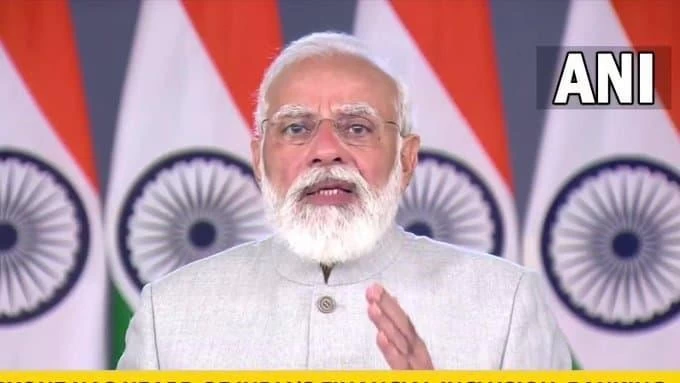New Delhi: Modern technologies have the potential to be used as instruments of conflict and domination, and democratic nations should work together on cryptocurrency to ensure it does not end up in the wrong hands, Prime Minister Narendra Modi said on Thursday.
India has created a “robust framework of data protection, privacy and security”, and is using data to empower people within a democratic framework with strong guarantees of individual rights, Modi said in a virtual keynote address at the Sydney Dialogue organised by the Australian Strategic Policy Institute.
Describing technology and data as “new weapons”, Modi said: “Technology has already become a major instrument of global competition and key to shaping the future international order...The biggest strength of democracy is openness. At the same time, we should not allow a few vested interests to misuse this openness.”
While it is essential for democracies to work together to develop governance standards and norms consistent with democratic values, this process should recognise national rights and promote the larger public good, he said.
“Take cryptocurrency or Bitcoin for example. It is important that all democratic nations work together on this and ensure it does not end up in wrong hands, which can spoil our youth,” he said.
Modi added, “We are at a historic moment of choice – whether all the wonderful powers of technology of our age will be instruments of cooperation or conflict, coercion or choice, domination or development, oppression or opportunity. India, Australia and our partners in the Indo-Pacific region and beyond hear the call of our times.”
The prime minister’s remarks came five days after he chaired a meeting on the way forward on cryptocurrency, during which the issue of misleading non-transparent advertising on cryptocurrency was flagged. Officials had also warned that such unregulated markets cannot be allowed to become avenues for money laundering and terror financing.
The government is considering strong regulatory steps and planning to forge global partnerships and collective strategies since the issue cuts across geographical borders.
Describing data as the “greatest product of technology”, Modi said India has “created a robust framework of data protection, privacy and security”, and also has unmatched experience in using data to empower people within a democratic framework with strong guarantees of individual rights.
He suggested democracies should come together to build a future that reflects democratic values by investing in research and development of future technology, developing a trusted manufacturing base and trusted supply chains, and deepening intelligence and operational cooperation on cybersecurity and protection of critical information infrastructure.
Democracies should also work jointly to prevent manipulation of public opinions, develop technical and governance standards and norms consistent with democratic values, and create standards and norms for data governance and for cross-border flow that protect and secure data, he said.
ACHIEVEMENTS IN FIVE AREAS
Modi also listed India’s achievements in five key areas related to technology. He said the country is building the world’s most extensive public information infrastructure, and more than 1.3 billion Indians have a unique digital identity.
“We are on our way to connect 600,000 villages with broadband. We have built the world’s most efficient payment infrastructure, the UPI. Over 800 million Indians use internet, 750 million are on smartphones,” he added.
Secondly, India is transforming the lives of people by using digital technology for governance, inclusion, empowerment, connectivity, delivery of benefits and welfare. “Recently, we have used technology to deliver over 1.1 billion doses of vaccines, across India’s vast geography using Arogya Setu and CoWIN platforms,” he said.
Third, India has the world’s third largest and fastest growing startup ecosystem that is providing solutions to everything from health to national security, and fourth, industry, services and agriculture are undergoing a “massive digital transformation”.
The fifth key area listed by Modi was preparing India for the future by investing in indigenous capabilities in telecom technology such as 5G and 6G. “India is one of the leading nations in artificial intelligence and machine learning, especially in human-centred and ethical use of artificial intelligence. We are developing strong capabilities in cloud platforms and cloud computing,” he said.
All of this is key to resilience and digital sovereignty, and India’s space programme is now open to innovation and investment from the private sector.
“India is already a major centre for providing cybersecurity solutions and services to corporates around the world. We have set up a task force with our industry to make India a global hub for cyber security,” he said.
India is also preparing a package of incentives to become a key manufacturer of semiconductors and the country’s production-linked incentive schemes in electronics and telecom have attracted local and global players, he added.


